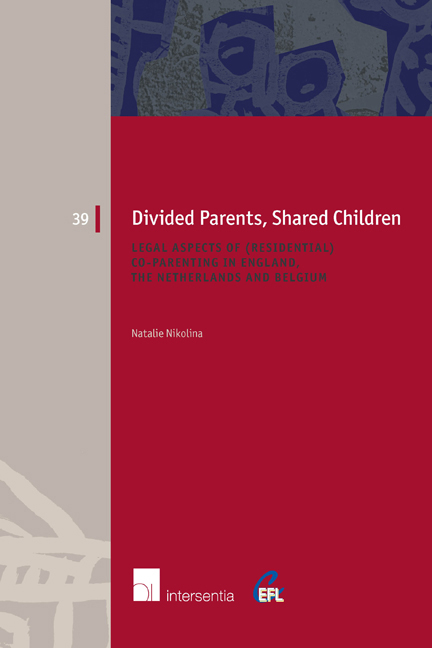 Divided Parents, Shared Children
Divided Parents, Shared Children Book contents
- Frontmatter
- Acknowledgements
- Contents
- Chapter 1 Introduction
- Chapter 2 International and European framework
- Chapter 3 The English legal system
- Chapter 4 The Dutch legal system
- Chapter 5 The Belgian legal system
- Chapter 6 Socio-psychological aspects of residential co-parenting
- Chapter 7 Comparative synthesis
- Chapter 8 Conclusions and recommendations
- References
- Samenvatting
- About the author
- European Family Law Series
Chapter 8 - Conclusions and recommendations
Published online by Cambridge University Press: 12 December 2017
- Frontmatter
- Acknowledgements
- Contents
- Chapter 1 Introduction
- Chapter 2 International and European framework
- Chapter 3 The English legal system
- Chapter 4 The Dutch legal system
- Chapter 5 The Belgian legal system
- Chapter 6 Socio-psychological aspects of residential co-parenting
- Chapter 7 Comparative synthesis
- Chapter 8 Conclusions and recommendations
- References
- Samenvatting
- About the author
- European Family Law Series
Summary
The goal of this book and the PhD research it is based upon was to find out if (residential) co-parenting after separation is in the best interests of children and if this is the case whether (residential) co-parenting can and should be stimulated through legal action, and if (residential) co-parenting is detrimental to the best interests of children, whether it can and should be discouraged through legal action.
One side of the coin is the legal situation: the international, European and national legal framework, the other is the social context in which it has to function. Chapter 2 showed that international and European instruments in their current form only encourage the retention of joint parental responsibilities post-separation and do not contain provisions that would either encourage or discourage (residential) co-parenting. This does not mean that international, and especially European, law should be disregarded in the discussion of (residential) co-parenting. Over the years the amount of instruments with a (possible) influence on family law has grown and the provisions have become more substantial with greater encroachment upon the national systems. Instruments such as the ECHR have the potential to become more involved in issues surrounding (residential) co-parenting in the future and the CRC has already influenced the way in which national courts deal with the child's right to be heard.
Turning to the national laws of the three countries it is clear that there are many similarities and overlaps. It is no longer contested that joint parental responsibilities should continue after the parents separate, nor that same-sex parents should have the same rights as different-sex parents do, or that children should have the right to be heard in proceedings concerning them. These things have become the legal norm. The national courts struggle with the same kind of petitions from parents and with similar difficulties of enforcement.
Perhaps because there are so many similarities between the three countries socially and legally, it is even more interesting to encounter differences as it means that the same, or similar, problems can have multiple solutions and perhaps some solutions are better (for the child(ren) involved) than others.
- Type
- Chapter
- Information
- Divided Parents, Shared ChildrenLegal Aspects of (Residential) Co-Parenting in England, the Netherlands and Belgium, pp. 205 - 210Publisher: IntersentiaPrint publication year: 2015
